TheQfactor
Thursday, February 26
'Armed robbery' Israeli troops raid Palestinian banks, take $9-million
By Matthew Kalman, Globe and Mail, February 26, 2004
In scenes reminiscent of a Wild West holdup, Israeli troops raided Palestinian banks in the West Bank city of Ramallah yesterday and seized at least $9-million in cash from the vaults, money Israel said was being used to fund terrorism.
"The first thought that struck me was that it was an armed robbery," said Emil Barham, a manager at one of the banks. "Then we realized it really was an armed robbery."
Troops fired tear gas and rubber bullets at Palestinian youths who pelted them with rocks and Molotov cocktails as the Israeli forces also raided the offices of several charities in downtown Ramallah, including the Nelson Mandela Foundation and the Palestinian Prisoners' Club. Thousands of documents were taken away in armoured jeeps. [...more]
Thursday, February 12
Osama's Navy
Gary Jones, Morror.co.uk, February 12, 2004

OSAMA bin Laden has a "terrorist navy" of 15 ships. And Scotland Yard has warned one could sail up the Thames to attack Parliament.
The vessels - capable of carrying lethal chemicals or a dirty bomb - could also ram cruise liners, oil rigs or enter ports on missions of destruction.
A private memo sent to police chiefs by the Met's marine unit is headlined: Next Terror Attack Waterborne?
Ship insurer Lloyd's of London is said to be helping MI6 and the CIA trace vessels bought by al-Qaeda from a Greek shipping magnate with links to bin Laden.
The memo states shipping agents have been asked to help in the search.
The report by the Met - which says it obtained its intelligence from maritime agencies - states: "Al-Qaeda has reportedly taken possession of 15 ships, forming what could be described as the first terrorist navy. The ships fly the flags of Yemen and Somalia where they are registered - and are capable of carrying lethal cargoes of chemicals or a dirty bomb."
Vessels flying the flags of Senegal, Liberia and the Caribbean island of St Vincent are also under suspicion.
The ships are believed to be in the Indian or Pacific oceans. But with 120,000 vessels worldwide, the chance of finding them is slim.
[...more]
US officials have captured al-Qaeda's chief of naval operations, Abdulrahim Mohammed Abda Al-Nasheri, who is known as the Prince of the Sea. They believe he masterminded the October 2000 bombing of the USS Cole in Aden which killed 17 sailors and wounded 40 others.
Al-Nasheri plotted an attack on British and US warships in the Gibraltar Straits, but the Moroccan security services prevented the suicide missions by arresting Saudi Arabian al-Qaeda members.
Will Press Pounce on Drudge's Kerry Rumor?
Commondreams.org, February 12, 2004
NEW YORK - Matt Drudge's Web site, which first broke allegations about President Bill Clinton's dalliance with a White House intern in 1998, is at it again.
Late this morning, DrudgeReport.com alleged that a new scandal was about to rock the campaign of Democratic frontrunner John Kerry: some sort of purported recent marital "infidelity" that involved a woman who once worked for the Associated Press, and has now supposedly "fled the country." According to the site, this story was being investigated by the AP, The Washington Post, Time magazine and ABC network.
Reached by E&P for comment, AP spokesman Jack Stokes said, "We simply don't comment on stories we are pursuing or not pursuing."
The Drudge site also declared that General Wesley Clark, in an off-the-record chat with reporters earlier this week, predicted that the Kerry campaign would soon implode due to an "intern." It would seem strange, however, if he really believed that, that he would drop out of the race, as he did yesterday.
The site added, however, that the Kerry rumor helped explain why Howard Dean did stay in the race and has been increasingly aggressive in his attacks on Kerry this week.
--------------------------
Campaign Drama Rocks Democrats: Kerry Fights Off Media Probe of Recent Alleged Infidelity, Rivals Predict Ruin
A Drudge Report Exclusive, February 12, 2004
 A frantic behind-the-scenes drama is unfolding around Sen. John Kerry and his quest to lockup the Democratic nomination for president, the DRUDGE REPORT can reveal.
A frantic behind-the-scenes drama is unfolding around Sen. John Kerry and his quest to lockup the Democratic nomination for president, the DRUDGE REPORT can reveal.
Intrigue surrounds a woman who recently fled the country, reportedly at the prodding of Kerry, the DRUDGE REPORT has learned.
A serious investigation of the woman and the nature of her relationship with Sen. John Kerry has been underway at TIME magazine, ABC NEWS, the WASHINGTON POST, THE HILL and the ASSOCIATED PRESS, where the woman in question once worked.
MORE
A close friend of the woman first approached a reporter late last year claiming fantastic stories -- stories that now threaten to turn the race for the presidency on its head!
In an off-the-record conversation with a dozen reporters earlier this week, General Wesley Clark plainly stated: "Kerry will implode over an intern issue." [Three reporters in attendance confirm Clark made the startling comments.]
The Kerry commotion is why Howard Dean has turned increasingly aggressive against Kerry in recent days, and is the key reason why Dean reversed his decision to drop out of the race after Wisconsin, top campaign sources tell the DRUDGE REPORT.
Wednesday, February 11
What did the Vice-President do for Halliburton?
By Jane Mayer, The New Yorker, February 9, 2004
Vice-President Dick Cheney is well known for his discretion, but his official White House biography, as posted on his Web site, may exceed even his own stringent standards. It traces the sixty-three years from his birth, in Lincoln, Nebraska, in 1941, through college and graduate school, and describes his increasingly powerful jobs in Washington. Yet one chapter of Cheney's life is missing. The record notes that he has been a "businessman" but fails to mention the five extraordinarily lucrative years that he spent, immediately before becoming Vice-President, as chief executive of Halliburton, the world's largest oil-and-gas-services company. The conglomerate, which is based in Houston, is now the biggest private contractor for American forces in Iraq; it has received contracts worth some eleven billion dollars for its work there.
Cheney earned forty-four million dollars during his tenure at Halliburton. Although he has said that he "severed all my ties with the company," he continues to collect deferred compensation worth approximately a hundred and fifty thousand dollars a year, and he retains stock options worth more than eighteen million dollars. He has announced that he will donate proceeds from the stock options to charity.
Such actions have not quelled criticism. Halliburton has become a favorite target for Democrats, who use it as shorthand for a host of doubts about conflicts of interest, undue corporate influence, and hidden motives behind Bush Administration policy -- in particular, its reasons for going to war in Iraq.
Like Dow Chemical during the Vietnam War, or Enron three years ago, Halliburton has evolved into a symbol useful in rallying the opposition. On the night that John Kerry won the Iowa caucuses, he took a ritual swipe at the Administration's "open hand" for Halliburton. [...more]
RUSSERT GETS IRAQ'D
Spencer Ackerman, The New Republic Online, Feb 9, 2004
There are only so many follow-up questions a journalist can ask in a one-hour interview. Aware of his time restrictions, Tim Russert decided to ask President Bush as few of them as possible. Viewers who tuned in to yesterday's Oval Office edition of NBC's "Meet the Press" watched Russert erratically vary the heat on his grilling of the president,
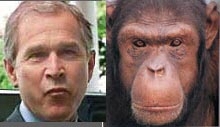
cranking the flame up highest when querying Bush about the characterological controversy of the moment--Bush's apparent absence from a year of his Air National Guard duty--but switching to a low sizzle when discussing the foreign country we're occupying, Iraq.
Russert certainly spent time soliciting Bush's comments about the lack of weapons of mass destruction in Iraq. In the wake of U.S. weapons hunter David Kay's revelation to Congress late last month that Iraq most likely possessed no WMD since the 1990s, it would be impossible to ignore the combination of intelligence failures and administration misrepresentations that surrounded the most audacious U.S. foreign policy gamble in 40 years. But when it came to the aftermath--or, more precisely, the ultimate outcome--of the war, Russert seemed content to accept every syllable that came from the president's mouth, no matter how cavalier or absurd. [...more]
Janet Jackson's Mammary Moment
Boob Tube Super Bowl
By Dr. SUSAN BLOCK, Counterpunch, Feb 9. 2004
We Americans are embarrassing ourselves again. Back in the late 1990s, a certain Independent Prosecutor showed the world our obsession with our President’s sex life. More recently, our current President showed ‘em that America could bomb the crap out of a country, if we felt like it. Then Janet showed America her silver starburst. Now Americans are showing the world we’ve gone bananas over a breast.
We Americans love to show off, and we love to watch. We make the whole world watch our stars and our wars. It’s often embarrassing, but I guess we just can’t help ourselves.
I like to watch, I confess. I mean, for once in my life, I wish I was a football fan. Yes, I didn’t watch the Super Boob--uh, Bowl, so I missed seeing the notorious Janet Jackson/Justin Timberlake “wardrobe malfunction” live.
However, I have been able to view it in digital stills on the Internet, from four or five different angles, plus a fine close-up, thanks to the Drudge Report. And all I can say is: Nice. A lovely, well-shaped, obviously real, stylishly pierced, middle-aged breast of color. What’s not to like?
Apparently, a host of evils of obscene and embarrassing proportions, according to America’s new Anthony Comstock of the Airwaves: Federal Communications Commission Chief Michael Powell (whose naked head looks kind of obscene and embarrassing to me).
If only Michael’s Papa, U.S. Secretary of State Colin Powell, would get as exercised over the missing WMDs as his son has gotten over a pop star’s missing bra cup, America might be less embarrassed about being caught with our political pants down right now. But no. The father keeps his council about the Bushies’ bogus “mushroom cloud,” while the son blowblows his stack over a boob.
There he was, ensconced in the bosom of his family, “gathered around” the boob tube, for a “celebration” of 280-pound pseudo-soldiers clobbering one another, when the Jackson Breast busted out upon his screen for one eternal second in a long shot. Powell was “outraged!” How dare his delight in the wholesome spectacle of men in dirty tights body-slamming other men in dirty tights be “tainted” by such a “classless, crass and deplorable stunt”? Horrors! A boob! On the other hand, I’m sure the Powell Family really enjoyed the Viagra commercials. Erectile dysfunction: yes! Wardrobe malfunction: no.
And yet, the Super Boob rules. Janet’s ripe right melon is everywhere, in family newspapers, magazines, TV, all over the Internet. Hey, once one shows it, the rest can too! We have the prudes to thank, in part, for this massive media proliferation. What Ken Starr did for blowjobs and semen stains, Michael Powell is doing for pierced mammaries.
Now all sorts of righteously indignant Americans are speaking out against the vile sight...[...more]
Atkins' Records Ignite Another Diet Fight
:
By SARA KUGLER, Associated Press, February 10. 2004
NEW YORK (AP) - The debate over Dr. Robert Atkins' popular high-fat, low-carb diet flared posthumously Tuesday when it was learned that Atkins himself was a bloated 258 pounds at his death.
A city medical examiner's report filed after Atkins' 2003 death from a fall showed the 6-foot doctor was at a weight normally considered obese. A physicians group that is highly critical of the diet released details of the report, claiming the Atkins diet led to weight and heart troubles for its 72-year-old creator.
Atkins' allies immediately disputed that.
The Atkins Physicians Council said the carbohydrate-shunning doctor gained more than 60 pounds through fluid retention in the eight days he spent in a coma before dying last April. He had slipped on an icy street and hit his head.
Atkins weighed 195 pounds when he was admitted, the group's chairman said." [...more]
Thursday, February 5
The 10 Richest Indians
Rediff.com, February 6, 2004
So who are the richest Indians? Well, the list of the country's top ten richest businessmen does have some of the usual suspects but also some surprises.










The latest Business Standard survey of India's billionaires shows that the slowdown in the IT sector saw many technology czars slipping down the pecking order. Satyam Computer's B Ramalinga Raju and no one from India's IT jewel Infosys Technologies is in the list. (N R Narayana Murthy does not figure as data on his holding in Infosys were not available).
The list shows the changing trends in the Indian economy, with promoters of firms from the 'old economy' taking many a top slot.
Click here for slide show
The combined net worth of the top 125 richest Indian businessmen increased by 11 per cent, from Rs 1,08,960 crore ($23.95 billion) on December 31, 2002 to Rs 1,20,951 crore ($26.60 billion) as on August 31, 2003.
Don't be fooled again
Critics of the war must voice their misgivings about the Butler inquiry's terms of reference - right now
Jonathan Freedland,The Guardian, February 4, 2004
Where do you even start? Perhaps with the comedy of George Bush
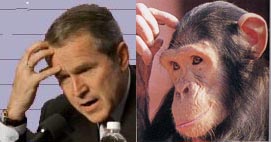
demanding 'to know the facts' about Iraq's non-existent arsenal of weapons of mass destruction - casting himself as an aggrieved American voter, somehow hoodwinked into the war with Iraq. No doubt we should brace ourselves for Bush pounding his fist on the table, demanding to know 'who ordered this goddamned war anyway?' And to think, he could have known all the facts without firing a single shot - if only he had let Hans Blix and his team of UN inspectors finish their work.
Or perhaps we should begin with the hilarious sight of Colin Powell, who exactly a year ago treated the UN security council to a show-and-tell exposé of Saddam's terrifying arsenal, now admitting that, had he known Baghdad had no WMD, he would have had his doubts about going to war. With rather elegant understatement, he concedes it would have changed 'the political calculus'.
Maybe the right starting point is closer to home, with the alternative comedy of Tony Blair insisting as late as last week there could be no inquiry, no inquiry, no inquiry - until Bush ordered one in Washington and suddenly London saw the entire question in a new light. Now there is to be an inquiry. What was an unnecessary, ludicrous proposal last week when the Tories and Lib Dems demanded it is suddenly a rather good idea now that Mr Bush has smiled upon it.
The government says the trigger was the Senate testimony of Bush's handpicked weapons inspector, David Kay - he who quit as head of the Iraq Survey Group because, he concluded, Iraq's WMD were a mirage. That, says the government, made an inquiry "inevitable". In which case, why was it not signalled as soon as Dr Kay testified last Wednesday? Or even a week earlier when he quit? The truth is that Tony Blair is going into this inquiry the way he went into the war itself: as Tonto to the American Lone Ranger, Mini-Me to George Bush's Dr Evil.
Too cynical? Maybe so. But after last week's experience, deep scepticism is the required mode. For the Hutton episode was something of a loss of innocence for those who had preferred to assume the best of Britain's top institutions. Government allies have assailed the Hutton report's critics with this repeated refrain: "If you think Hutton is such a bad judge, why didn't you say so earlier? You were perfectly happy to accept him when you thought he was going to give Blair a kicking." There is power to this argument, but there is a response. It is that many who suspected the Iraq war was fought on a false basis believed the inquiry system would be fair; that a senior judge would take account of all the evidence he heard, not ignore large chunks of it.
[...more]
Wednesday, February 4
Daddy's Boys
by Tom Engelhardt, Tom Dispatch.com, February 4, 2004
Guess who's already calling around town in search of figures to be named to the "independent commission" to investigate intelligence failures in Iraq (and elsewhere), according to the New York Times? As Douglas Jehl and David E. Sanger report (Commission to Decide Itself on Depth of Its Investigation), "Mr. Bush, the White House said, plans to appoint the members himself, though Vice President Cheney has been calling around Capitol Hill sounding out ideas." The Great Sounder-Outer. I wonder what an idea Dick sounds out sounds like?
A name, a name… what's in a name? In the rigged crapshoot that's the commission to be, two curious and fascinating names have already floated by. The planned nine-member panel, White House officials said, "would include current and former officials with experience in intelligence matters."
Among the names Washington Post reporters Dana Milbank and Dana Priest mention (Intelligence Panel Will Cast Net Beyond Iraq) is that of former CIA director James Woolsey. He would certainly be a fabulous addition to any merry band of pranksters this administration put together.
As Paul Woodward, editor of the always interesting War in Context website comments, "If James Woolsey -- a man who before the war merrily tried to popularize the slogan, 'Give war a chance' -- is included in this commission it will be exposed as an utter charade.
" Woolsey, who also popularized the idea -- post-the-Afghan but pre-the-Iraqi war -- that we were already enmeshed in "World War IV" and rushed off on a bizarre series of semi-private intelligence adventures for members of the administration, won't make the cut, I suspect. But just seeing his name surface adds a bit of zest to this black (or is it bleak) comedy.
[...more]
TomPaine.com Takes Ad Campaign against Pentagon Adviser Richard Perle Underground
WASHINGTON, Feb. 2 /U.S. Newswire/ -- Yesterday, TomPaine.com began a month-long campaign challenging Pentagon adviser Richard Perle's personal conflicts of interest by placing ads in 10 prominent subway stations throughout the Washington, D.C., metropolitan area.
TomPaine.com's executive editor, Nick Penniman said, "Perle is further evidence of the decadent mercenary culture that governs Washington today. He's one of the most prominent armchair generals, who doesn't hesitate to advocate war as long as he can fight it from the safety of a television studio or a Washington think tank."
The ad reads, in part:
"As a Pentagon adviser, he helped lure the White House into invading Iraq while briefing investors on ways to make money off the conflict. Did Perle offer better advice to the businessmen than to the president? After all, it was he who said that Iraq was teeming with weapons of mass destruction... Only in Washington's twilight zone of policy, power and profits could a man like Perle thrive."
The ads can be seen at the following subway stations in the Washington, D.C. area: Capitol South, Crystal City, Farragut North, Farragut West (starts 2/15), Federal Center, Federal Triangle, L'Enfant Plaza, McPherson Square, Metro Center, and Pentagon City.
[Contact: Nick Penniman, 202-332-2881 ext. 11, or Ellen Miller, 202-332-2881 ext. 10, both of TomPaine.com]
The original of the ad appeared in The New York Times on Jan. 14, 2004. It can be viewed on the TomPaine.com website at http://www.tompaine.com/op_ads/opad2.cfm/ID/9757
The unknown man
Film noir wouldn't be the same without Georges Simenon's tales of mystery, scandal and sexual misdemeanour. But how much were his stories inspired by his own life?

Peter Lennon, The Guardian, July 5, 2003
Throughout the summer, Liège is celebrating the centenary of the birth of one of its most famous and wayward sons, Georges Simenon. An immense canopy spanning 2,500m has been put up over the town's Espace Tivoli, under which the acts and artefacts of one of the world's most prolific writers are on display. There is the obligatory re-created writing den, but also a series of portholed cabins recalling his obsession with boat and barge; a cinema constantly reruns old Maigret films; every wall is lurid with his old paperbacks.
There are about 70 Maigret stories, 193 Simenon novels and about 200 books of pulp romances and adventure produced under pseudonyms - Sim, Kim, Gut, Plick and Pluck, Christian Brüll (his mother's maiden name), Georges d'Isly, Jean du Perry and G Violis...
Commercial success came early to a youth who could deliver, when necessary, 8,000 words a day of "stories for secretaries", as he put it. His skill in characterisation developed rapidly, until, in March 1930, the figure who was to rank with the top detectives in world literature emerged. Commissaire Jules Maigret is more of a genuinely rounded human being than the collection of tics and talent that is Sherlock Holmes, and he has decidedly more grey cells than the posturing Hercule Poirot.
What distinguishes Simenon is the disciplined spareness of the writing - essential to an author who often set himself the task of getting a book down in eight days - and the emphasis on character. A Maigret story may begin as a banal detective yarn, but the characters develop with oppressive intensity. Take one story, L'Ombre Chinoise (1963). The unhurried probings by the placid, intuitive Maigret expose the weaknesses of his suspects, peeling away the layers as if they were so many onions, until the wife of the impoverished civil servant is revealed in all her rancorous malevolence. There are no car chases; one bullet does for an entire story. But the intensity is unrelenting, until an exhausted Maigret returns home to the culinary comforts of his wife.
There is a case to be made that Maigret's life was a projection of a fantasy of Simenon's: returning each night to a stable domestic environment, having mastered the demons beyond. He certainly took pains to look like Maigret, with his soft-brimmed fedora and his ever-present pipe.
But the reality was very different. Simenon's sexual appetite was gargantuan.
[...more]
Influential Friends:
As the last ever series of Friends begins, Sarfraz Manzoor says it has been much more than a brilliant comedy - it has changed our language, our hair and even our drinking habits
The Guardian, February 4, 2004

Friends: the first aspirational sitcom
"Brad Pitt and I don't, at first glance, have much in common. He is a film star who is regularly voted the most desirable man on earth and lives in a French Normandy mansion in Beverly Hills. I was once interviewed on BBC Three Counties radio, spend most weekends in Luton and to the best of my knowledge have yet to top a poll of the sexiest men alive.
Despite these dissimilarities Brad and I do share at least this: we have both appeared on Friends. [...more]
...My fleeting flirtation with non-fame was made possible after I had interviewed the programme's creators for a newspaper article. Pitt got his gig after marrying one of the show's stars.
Nine years ago Jennifer Aniston was just another aspiring actress, most famous for being the god-daughter of the bald-headed lollipop-sucking-TV-detective-playing Telly Savalas. Today she is one half of the most beautiful couple in Hollywood and, according to Forbes magazine, the most powerful celebrity in the world. Friends has transformed her life, and there is perhaps no better indication of how huge the programme has become than the marriage between her and Pitt. It might not have been as cynical as Seinfeld, as sexy as Sex and the City, or as sophisticated as Frasier, but as a cultural phenomenon Friends has, for the past decade, been the biggest thing on the small screen. Could it be any more influential?
I was 23 when it began; the characters in Friends were also around my age.
They were American, and so naturally more self-obsessed than anyone I knew, but their anxieties were shared by many of my generation.
This was a generation that was marrying less and later than any in history.
We were more affluent than our parents, but at the mercy of job insecurity; we wanted love, not just marriage, but the loneliness of the city made it hard to even meet anyone let alone find a soulmate.
Friends resonated not only because it was brilliantly funny, but also because it struck a chord with its audience. If Seinfeld was, famously, a show about nothing, Friends was a programme about arrested development and our desire for an extended adolescence.
The reassuring subtext to Ross and Rachel's turbulent love lives, and Monica and Chandler's unfulfilled careers, was that it was normal to be directionless in love and work even in your late 20s. (It was an appealing suggestion, albeit based on the fiction of spacious and yet puzzlingly affordable Manhattan apartments.) [...more]
We also wanted to drink endless cappuccinos. Tellingly, the first New York Starbucks store opened in the same year that Friends started. The dual rise of coffee culture and Friends was one example of how the show captured the zeitgeist. At other times it defined it. The "Rachel" was the most copied television hairstyle since Farrah Fawcett's flick.
The series has even been credited with influencing how many of us speak. Researchers at the University of Toronto analysed every episode from the first eight seasons to explore whether popular culture influenced how we speak. After tabulating 9,000 adjectives they concluded that its linguistic influence could be summed up in one word.
Previously, the commonest way to intensify a noun was by using "very" or "really"; on Friends the most common intensifier was "so".
A style of speech once the preserve of Californian teenage girls has, through Friends, spread to become, like, so common.
... ... The entire premise of the show rested on the suggestion that being single was sexy and that all you need are friends; when those foundations began to weaken, Friends began to show its age. When they were in their 20s, the characters' petty anxieties and mutual dependencies seemed endearing. When those same characters hit their mid-30s, and some of the actors approached 40, it began to look self-indulgent.
Friends never pretended to be authentic, but lately the unrealities were threatening to sour the entertainment. Theirs was a New York where planes did not crash into skyscrapers and the only thing to fear was Phoebe's singing.
If comedy is all about timing then the cast have timed their departure to perfection. Aniston, Lisa Kudrow, Matthew Perry and Courteney Cox are all making movies; David Schwimmer is planning to direct. And while the last episode of Friends may have been filmed, Matt Le Blanc has already signed to star in an eponymous spin-off. Expect to see some familiar faces making guest appearances. Goodbye Friends, hello Joey. How you doin?
Monday, February 2
The things you're searching for.
Lycos 50: Janet Makes History
February 4, 2004
Janet Jackson exposing her breast during the Super Bowl halftime show on Sunday night has proved to be the most-searched event in the history of the Internet.
On Monday, Janet Jackson and the halftime show received 60 times as many searches as the Paris Hilton sex tape and 80 times as many searches as Britney Spears. Jackson was searched 50 times for every request for the topic that normally dominates on the day after the game, Super Bowl commercials. She also received 275 times as many searches as the streaker who ran on the field before the second half, and 350 times as many searches as Super Bowl MVP Tom Brady.
Janet Jackson wasn't the only person involved in the stunt, of course. Justin Timberlake received 40 times as many searches as he does on a normal day.
Prior to this week, the most-searched event in the history of the Lycos 50 over a one-day period was the September 11 attack on America. Although it is very difficult to compare searches for the two events, it looks like the Super Bowl halftime show was the equal of September 11 when it comes to Internet attention. That is, to put it bluntly, mind-blowing.
Why is it difficult to compare? The Super Bowl halftime show was a single event. Searches revolved almost entirely around two phrases, either Super Bowl halftime or Janet Jackson. Everybody knew exactly what they were looking for.
[...more]
-------------------
Janet Jackson Apologizes for Bared Breast
:
NEKESA MUMBI MOODY, Associated Press, February 2, 2004
NEW YORK - Janet Jackson apologized Monday for an incident in which one of her breasts was bared for a moment as she sang with Justin Timberlake during the Super Bowl halftime show Sunday night.
In a statement released Monday night, Jackson said it was a last-minute stunt that went awry.
'The decision to have a costume reveal at the end of my halftime show performance was made after final rehearsals. MTV was completely unaware of it,' Jackson said. 'It was not my intention that it go as far as it did. I apologize to anyone offended - including the audience, MTV, CBS and the NFL.' [...more]

Sunday, February 1
Palestine and the Anti-War Movement
By LEE SUSTAR, Counterpunch, Jan 31/February 1, 2004
Should the antiwar movement take up the question of Palestine?
Or, to put the question another way, can the movement oppose one element of U.S. domination of the Middle East, the occupation of Iraq, while ignoring the other--the increasingly savage Israeli occupation of Palestine that's funded, armed and politically supported by Washington?
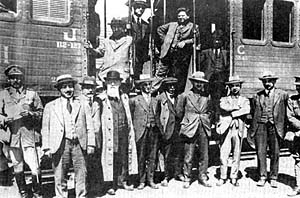 Founded by mainly European Jewish settlers, known as Zionists, in British-controlled Palestine in 1948, Israel was based on the expulsion of 750,000 Palestinians through killing and terror, including massacres of entire villages. Jews, who owned 6 percent of the land in 1947, established their state on land that was 94 percent owned, farmed and used by Palestinians.
Founded by mainly European Jewish settlers, known as Zionists, in British-controlled Palestine in 1948, Israel was based on the expulsion of 750,000 Palestinians through killing and terror, including massacres of entire villages. Jews, who owned 6 percent of the land in 1947, established their state on land that was 94 percent owned, farmed and used by Palestinians.
Israeli historian Benny Morris, whose research has uncovered a series of Israeli massacres in 1948, recently declared that "from my point of view, the need to establish this state in this place overcame the injustice that was done to the Palestinians by uprooting them...Even the great American democracy could not have been created without the annihilation of the Indians."
The Zionists, who justified their demand for a Jewish state by pointing to the horrors of anti-Semitism and the Holocaust, created Israel through the oppression of another people. In the 1967 Arab-Israeli war, Israel seized more territory, and Palestinians in the West Bank and Gaza have lived under Israeli military occupation ever since. Some 2,200 settlers gained control of 40 percent of the land in Gaza; in the West Bank, 55 percent of the land and 70 percent of the water was seized for Jewish settlers.
* * *
ISRAEL COULD never have come into existence without the backing of imperialist powers. The Israeli newspaper Ha1aretz made this point in 1951: "Israel is to become the watchdog... if for any reasons the Western powers should sometimes prefer to close their eyes, Israel could be relied upon to punish one or several neighboring states whose discourtesy to the West went beyond the bounds of the permissible."
We saw this dynamic in October, when Syria--already under pressure from Washington in its so-called "war on terrorism"--was hit with Israeli bombs and missiles just 10 miles from the capital city of Damascus. George W. Bush's response: "Israel's got a right to defend herself."
This was only the latest example of a double standard whereby the U.S. bombs Iraq supposedly for violating United Nations (UN) resolutions, but supports Israel's continued violation of them. Israel is also exempt from Bush's drive to rid the Middle East of weapons of mass destruction and nuclear weapons.
[...more]
We seem to have forgotten that a man took his own life
Melanie McDonagh, The Observer, February 1, 2004
The Kelly/Hutton/BBC/Gilligan/Blair affair is a big boy's battle. Women - well, most of them - have got much more sense...
One of the unspoken realities about news and current affairs is how often that arena gets turned into a boys' playground. Because however much we pretend that the sexes see the world exactly the same, women's views of what is important, and not, is by no means the same as men's.
It struck home that the Hutton inquiry and the row that followed was one for the boys when a girlfriend rang me up after Alastair Campbell's bravura swagger on the staircase at the Foreign Press Association after his vindication by the inquiry. 'Hutton...' she said, sotto voce. 'Big dicks.' And you know what? I could see exactly what she meant.
The elements that appeal to the nerdy, detail-obsessed, slightly autistic and testosterone-sensitive personality that is the political male are stamped all over the Hutton affair.
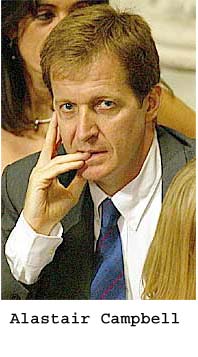
First of all, there's the street-fight element. That's always attractive to the weedy boys looking on as well as to the bruisers.
Campbell, in every single aspect of this row - in defeat, spite; in victory, revenge - had the look of a man who was going to make the fight dirty. His diary quote (he was going to fuck Gilligan)
--summed up the tone, and the obsessive and vicious personal element of his vendetta with Andrew Gilligan and the BBC was borne out right to Friday's bullish performance on stage in South Shields.
[...more]
Civil War Breaks Out at BBC as Hutton Backlash Grows
by Francis Elliott and Michael Williams, The Independent, February 1, 2004
The BBC was at war with itself yesterday, as rival factions began to attack each other over competing versions of the events that triggered the worst crisis in the corporation's long history.
Some of its senior managers turned on the journalist Andrew Gilligan, whose flawed reporting began the crisis, claiming that if he had not resigned last week, he would have been disciplined and possibly sacked.
Friends of Greg Dyke, the former director general, also weighed in, saying that he believed Mr Gilligan was guilty of "rubbishy journalism". Mr Dyke has also accused Downing Street of "systematic bullying" of the BBC over its coverage of the Iraq war.
Others within a divided BBC want its acting director general, Mark Byford, to continue the battle with the Government. A leaked document questions the accuracy of testimony given by Alastair Campbell, Tony Blair's former director of communications, to a Commons committee, and suggests that Lord Hutton's report, published last week, was "wrong in law".
]
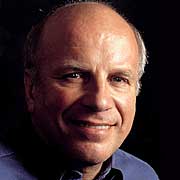
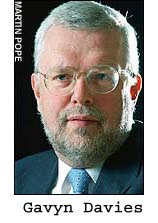
Mr Dyke was forced out of the BBC after a secret understanding with Gavyn Davies unraveled at the last minute, The Independent on Sunday can reveal.
The corporation's director general tendered his resignation to the governors on Thursday, confident that it would be rejected.
Instead, to his surprise, it was accepted.
[...more
Judy, Judy, Judy
by Katha Pollitt, The Nation, February 16th Issue
I used to think we should get rid of First Ladies. Plenty of countries manage without a national wife: Cherie Blair aside (and how long would Britain's answer to Hillary have lasted over here?), can you name the spouse of the man who leads France, Germany, China, Canada or Russia? And no, "Mrs. Putin" doesn't count as a correct answer. Is Lula married? What about Ariel Sharon? Is there a Mrs. General Musharraf ready with a nice cup of tea when her man comes home after walking the nuclear weapons? Do you care?
The ongoing public inquest into Dr. Judith Steinberg makes me see, however, that we need First Ladies: Without them, American women might actually believe that they are liberated, that modern marriage is an equal partnership, that the work they are trained for and paid to do is important whether or not they are married, and that it is socially acceptable for adult women in the year 2004 to possess distinct personalities--even quirks!
Without First Ladies, a woman might imagine that whether she keeps or changes her name is a private, personal choice, the way the young post-post-feminists always insist it is when they write those annoying articles explaining why they are now calling themselves Mrs. My Husband.
 The attack on Dr. Judy began on the front page of the New York Times (you know, the ultraliberal paper) with a January 13 feature by Jodi Wilgoren, full of catty remarks about her "sensible slipper flats and no makeup or earrings" and fatuous observations from such academic eminences as Myra Gutin, "who has taught a course on first ladies at Rider University in New Jersey for 20 years." It seems that Dr. Steinberg "fits nowhere" in Professor Gutin's categorizations. Given that she counts Pat Nixon as an "emerging spokeswoman," maybe that's not such a bad thing.
The attack on Dr. Judy began on the front page of the New York Times (you know, the ultraliberal paper) with a January 13 feature by Jodi Wilgoren, full of catty remarks about her "sensible slipper flats and no makeup or earrings" and fatuous observations from such academic eminences as Myra Gutin, "who has taught a course on first ladies at Rider University in New Jersey for 20 years." It seems that Dr. Steinberg "fits nowhere" in Professor Gutin's categorizations. Given that she counts Pat Nixon as an "emerging spokeswoman," maybe that's not such a bad thing.
"The doctors Dean seem to be in need of some tips on togetherness and building a healthy political marriage," opined Maureen Dowd, a single woman who, even if she weds tomorrow, will be in a nursing home by the time she's been married for twenty-three years like the Deans.
Tina Brown, another goddess of the hearth, compared Dr. Judy to mad Mrs. Rochester in Jane Eyre.
On ABC News's Primetime, Diane Sawyer put both Deans on the grill, with
--according to Alexander Stille, who counted for the LA Times, ninety negative questions out of a total of ninety-six.
Blinking and nodding like a kindly nurse coaxing a lunatic off a window ledge, Sawyer acted as if she wanted to understand Dr. Judy's bizarre behavior:
She keeps her maiden name professionally (just like, um, Diane Sawyer, a k a Mrs. Mike Nichols);
she doesn't follow the day-to-day of politics (like, what, 90 percent of Americans?); she enjoyed getting a rhododendron from Howard for her birthday.
Throughout this sexist inquisition, Dr. Steinberg remained as gentle as a fawn, polite and unassuming--herself. "I'm not a very 'thing' person," she said when Sawyer pressed too close on that all-important rhododendron. She allowed as how she was not too interested in clothes--whereupon Sawyer cut to a photo of Laura Bush, smiling placidly in a red ball gown.
I don't think Dr. Judy is weird at all. She's leading a normal, modern, middle-class-professional life. She has been married forever. She has two children. She likes camping and bike riding and picnics. She volunteers. She has work she loves, as a community physician--not, you'll note, as a cold-hearted status-obsessed selfish careerist user, as professional women are always accused of being. (Let's also note that she is not someone who was ever, even once, during her husband's twelve-year stint as governor of Vermont, accused of using her marriage to advance a friend or enrich herself or obtain special perks and privileges.)
And here's another secret: Not too many women in long marriages want to spend their lives gazing rapturously at their husband for the benefit of the camera every time he opens his mouth. Vermonters liked Judy Dean--they had no problem with her low-key, independent style. But, then, if you listen to the press, you know Vermonters--they're weird, too.
have no idea why Judith Steinberg hasn't slogged through the snow for her husband. Maybe she's nervous in public. Maybe she's busy. [...more]
How Global Warming May Cause the Next Ice Age...
by Thom Hartmann, Commondreams.org, January 30, 2004
While global warming is being officially ignored by the political arm of the Bush administration, and Al Gore's recent conference on the topic during one of the coldest days of recent years provided joke fodder for conservative talk show hosts, the citizens of Europe and the Pentagon are taking a new look at the greatest danger such climate change could produce for the northern hemisphere - a sudden shift into a new ice age.
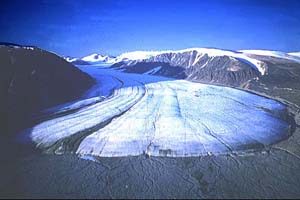
What they're finding is not at all comforting.
In quick summary, if enough cold, fresh water coming from the melting polar ice caps and the melting glaciers of Greenland flows into the northern Atlantic, it will shut down the Gulf Stream, which keeps Europe and northeastern North America warm. The worst-case scenario would be a full-blown return of the last ice age - in a period as short as 2 to 3 years from its onset - and the mid-case scenario would be a period like the "little ice age" of a few centuries ago that disrupted worldwide weather patterns leading to extremely harsh winters, droughts, worldwide desertification, crop failures, and wars around the world.
Here's how it works.
If you look at a globe, you'll see that the latitude of much of Europe and Scandinavia is the same as that of Alaska and permafrost-locked parts of northern Canada and central Siberia. Yet Europe has a climate more similar to that of the United States than northern Canada or Siberia. Why?
It turns out that our warmth is the result of ocean currents that bring warm surface water up from the equator into northern regions that would otherwise be so cold that even in summer they'd be covered with ice. The current of greatest concern is often referred to as "The Great Conveyor Belt," which includes what we call the Gulf Stream. [...more]
Where's the Apology?
by Paul Krugman, The New York Times, January 30, 2004
George Bush promised to bring honor and integrity back to the White House. Instead, he got rid of accountability.
Surely even supporters of the Iraq war must be dismayed by the administration's reaction to David Kay's recent statements. Iraq, he now admits, didn't have W.M.D., or even active programs to produce such weapons. Those much-ridiculed U.N. inspectors were right. (But Hans Blix appears to have gone down the memory hole. On Tuesday Mr. Bush declared that the war was justified — under U.N. Resolution 1441, no less — because Saddam "did not let us in.")
So where are the apologies? Where are the resignations? Where is the investigation of this intelligence debacle? All we have is bluster from Dick Cheney, evasive W.M.D.-related-program-activity language from Mr. Bush — and a determined effort to prevent an independent inquiry.
True, Mr. Kay still claims that this was a pure intelligence failure. I don't buy it: the Carnegie Endowment for International Peace has issued a damning report on how the threat from Iraq was hyped, and former officials warned of politicized intelligence during the war buildup. (Yes, the Hutton report gave Tony Blair a clean bill of health, but many people — including a majority of the British public, according to polls — regard that report as a whitewash.)
In any case, the point is that a grave mistake was made, and America's credibility has been badly damaged — and nobody is being held accountable. But that's standard operating procedure. As far as I can tell, nobody in the Bush administration has ever paid a price for being wrong. Instead, people are severely punished for telling inconvenient truths. And administration officials have consistently sought to freeze out, undermine or intimidate anyone who might try to check up on their performance.
Let's look at three examples. First is the Valerie Plame affair. [...more]
Still, the big story isn't about Mr. Bush; it's about what's happening to America. Other presidents would have liked to bully the C.I.A., stonewall investigations and give huge contracts to their friends without oversight. They knew, however, that they couldn't. What has gone wrong with our country that allows this president to get away with such things?
Truth catching up to Bush
HAROON SIDDIQUI, Toronto Star Editorial, January 29, 2004
Regardless of who emerges as the Democratic presidential nominee, the race has already served its greater democratic purpose: It has blown away George W. Bush's wartime aura of patriotic infallibility.
Not only Howard Dean, the passionate truth-teller about Iraq, but Senator John Kerry, Gen. Wesley Clark and others have found their voices to question almost all aspects of Bush's post-Sept. 11 performance.
They are bringing home to Americans the worldwide debates about their president's penchant for exploiting and fanning fears by exaggerating dangers, taking unilateral actions abroad, and squandering U.S. credibility.
"The U.S. is facing a crisis of international legitimacy," writes Robert Kagan, the respected analyst at the Carnegie Endowment for International Peace, in the upcoming spring issue of Foreign Affairs magazine.
Adds Serge Schmemann, editorial page editor of the Paris-based International Herald Tribune and a former writer for the New York Times: "I've been living in France for the past six months and I often wonder whether Americans are aware of the depth of the dread and revulsion in which Bush's United States is held by many foreigners."
But, thanks to the debates in the Democratic primaries and other developments, Americans are catching up.
Hardly a week goes by without new evidence of how Bush launched the war on Iraq on false pretences.
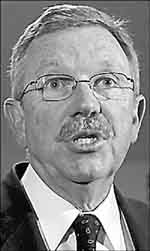
The latest source of embarrassment is America's own chief weapons hunter in Iraq.
David Kay has declared that:
--Iraq had no stockpiles of chemical or biological weapons.
--It did not, as claimed by Washington, ship out such weapons to Syria. It had none to ship.
--Iraq had no weapons programs to speak of after about 1995.
--Iraq did not get any nuclear cake from Niger.
--The mobile weapons lab that Dick Cheney and Colin Powell portrayed as death on wheels, were carriers of hydrogen for weather balloons.
These conclusions are the same as those of Scott Ritter, a member of the first United Nations weapons inspections team that was withdrawn in 1998. And of Hans Blix, head of the reconstituted U.N. inspections team. And of Mohamed ElBaradei, head of the International Atomic Energy Agency.
Kay made two more telling points, in interviews and at Congressional hearings yesterday.
The administration's exaggerations aside, the Central Intelligence Agency's intelligence gathering in Iraq was flawed, he said.
The CIA had infiltrated the U.N. Special Commission weapons inspection teams to spy on Iraqi weapons capabilities (just as Saddam Hussein had charged).
But "UNSCOM was like crack cocaine for the CIA," Kay told the New York Times. Once withdrawn, the CIA was adrift and missed a key development in Baghdad.
Saddam had lost touch with reality. He was approving every major decision himself. Scientists were running scams. They would present him with big schemes for weapons. He would grant huge sums of money. But not much would be done.
These were the same con artists, you will recall, whom Washington wanted interviewed by Blix and whisked out of Iraq so they could spill the beans on Saddam's secret weapons!
Despite Kay's devastating indictment, Bush and the boys are refusing to blink.
While no longer insisting, as they were until last week, that weapons would eventually be found, Bush, Cheney and others have slipped into their secondary argument: Saddam was evil and needed to be removed anyway.
But that was not their chosen tool to scare Americans into supporting their war. Rather, it was that Saddam could attack America with his deadly weapons, using missiles or terrorists.
To get around that blatant inconsistency, the White House is now trying a new tack: that Bush had never characterized Saddam's danger as "imminent," only as "grave and growing."
There is a difference?
The last time the White House tried such hair-splitting was when Bill Clinton argued it was not "sex" that he had had with Monica Lewinsky.
The difference in this case, of course, is that more than 500 Americans and nearly 15,000 Iraqi soldiers and civilians are dead.
As for the policy of toppling bad guys, of whom there are many, Human Rights Watch had something to say this week in a major report.
Humanitarian interventions, it said, are best reserved for stopping ongoing or imminent slaughters, as in Rwanda (where no one intervened in time) or in Iraq in 1988 when Saddam was gassing Kurds (and Washington winked). And such actions are best taken multilaterally.
The lone sheriff tableau is exclusively American — an outdated one at that, resurrected nonetheless in times of trouble for comforting reassurance. But if a Newsweek poll is any indication — Kerry leading Bush, 49 per cent to 46 per cent — the president may have overstayed his welcome in that role as well.
The shadow of Iraq
The Hutton saga is a sideshow. The real issue is who will pay the price for war and occupation
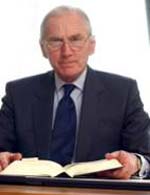
Seumas Milne, The Guardian, January 29, 2004
We have been here before. In April 1972, the former brigadier Lord Widgery published his now notorious report into the killing of 14 unarmed civil rights demonstrators by British paratroopers in Northern Ireland three months earlier on Bloody Sunday. Widgery cleared the soldiers of blame, insisting, in defiance of a mass of evidence, that they had only opened fire after coming under attack. The Widgery report was so widely seen as a flagrant establishment whitewash, and continued to be such a focus of nationalist anger, that a quarter of a century later Tony Blair felt compelled to set up another Bloody Sunday inquiry under Lord Saville, still sitting today.
Lord Hutton - a scion of the Northern Irish protestant ascendancy who himself represented British soldiers at the Widgery inquiry - has, if anything, outdone Widgery in his service to the powers that be.
Hutton's embrace of any construction of the evidence surrounding David Kelly's death that might be helpful to the government is breathtaking in its sweep.
Instead of a prime minister who took the country to war on the basis of discredited dossiers about Iraqi weapons of mass destruction, it is the BBC that now finds itself in the dock - and its chairman who was last night forced to resign.
Hutton's report could scarcely have been more favourable if it had been drafted, or even sexed up, by Tony Blair's former spinmeister Alastair Campbell himself. The prime minister certainly knew his man when he appointed the one-time Diplock court judge to head the inquiry into Dr Kelly's death.
Fortunately, we have the inquiry transcripts to test against Lord Hutton's almost comically tendentious conclusions.
We know, for example, that Blair's chief of staff Jonathan Powell asked the joint intelligence committee's John Scarlett to redraft that part of the September dossier which suggested Saddam Hussein might use chemical and biological weapons "if he believes his regime is under threat" - and Scarlett did so, by taking out the qualifications.
We know that Campbell asked Scarlett to change a claim that the Iraqi military "may be able" to deploy chemical or biological weapons within 45 minutes to "are able". But Lord Hutton is of the view that this is not at all the "sexing up" that the BBC reporter Andrew Gilligan quoted Kelly as complaining about.
We also know that Blair chaired the meeting at which the strategy for outing Kelly was adopted, even though the prime minister later denied having anything to do with it. But, in the Alice-in-Wonderland world of Lord Hutton, that was entirely consistent and honourable.
There are different ways of reading the spectacular one-sidedness of Hutton's conclusions.
One is that the Ulster law lord might be a touch naive about the seamier side of 21st century political life; another, that the legalistic defence offered by Blair, Hoon and senior civil servants naturally appealed to a conservative judge far more than the BBC journalists' case that the main thrust of their story was in fact right; a third that, as a lifelong servant of the British crown, he knew where his duty lay when the credibility of the state was at risk.
But whatever the mixture of motives, Hutton's unqualified endorsement of the government's behaviour is bound, in the current climate, to be widely regarded in the country as a cover-up.
It will have no credibility for millions who opposed the war on Iraq; it will merely add to the sense that the political system is unable to deal with the crisis triggered by Britain's participation in the illegal invasion and occupation.
The Hutton saga has in reality been a very British sideshow to that central issue - and the now barely-contested consensus that the reasons given for joining the war were false.
Next to the national and global implications of what has been done - and the more than 15,000 people estimated to have died as a result - a loosely worded 6.07am BBC radio broadcast, and even the grim death of Dr Kelly, pale into insignificance.
By setting up an inquiry into the Kelly affair, Blair created a partially successful diversion from the far more serious - and more threatening to him personally - questions raised by the war itself. [ ... more]
Hutton Inquiry Whitewashes Blair Government's Exaggerations
Professor of History, University of Michigan, January 29, 2003
Seumas Milne of the Guardian argues that the report by Lord Hutton on the David Kelly affair is biased in favor of the government of Tony Blair.
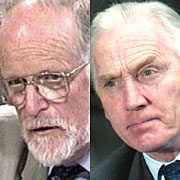
This affair is extremely complex. Let me see if I can get it basically right, in a concise way. David Kelly, a microbiologist, had worked for the British ministry of defense and served as a UN arms inspector in Iraq.
It is probably unrelated to the story that in the course of his inspections he met a US servicewoman, Sgt. Mai Pederson, an Egyptian-American. She is alleged to have been an undercover US intelligence officer, but denies it. She, incidentally, had become a member of the Baha'i Faith when whe was a teen in the US. She converted Kelly to the religion, which was founded in Baghdad in 1863 by the Iranian notable Baha'u'llah. ... ...
Kelly returned to his home in Oxford. He was convinced that Saddam still had chemical and biological weapons, and appears to have advised the British government of this belief.
But then beginning in the fall of 2002, he had three conversations with Andrew Gilligan, a BBC defense reporter, from which the reporter took away the impression that Kelly thought the case for Iraqi WMD was being exaggerated by the Blair government.
One issue was whether Blair's director of communications, Alastair Campbell, had intervened in the wording of a British security report on Iraq to make it seem more alarming than did the original phraseology. The reporter then went public with the charge that the Blairites had deliberately exaggerated or in the quaint British phrase "sexed up" the evidence for Saddam's weapons capability. This was on May 22, 2003.
The Blair government strenuously denied any such intentional tampering with the facts, and put enormous pressure on the reporter and the BBC to retract.
On July 4, Kelly came in from the cold and let the Blair government know that he was one of Gilligan's sources, but denied being the sole source or of alleging all the misconduct that Gilligan did.
Blair officials were relieved that Kelly was a relative outsider who wouldn't have had intimate knowledge of cabinet meetings, e.g.; they also knew that Kelly was himself a hardliner on Iraqi WMD, and that it was likely Gilligan had exaggerated Kelly's critique.
They made a deliberate decision to out Kelly. Kelly had a security clearance and wasn't supposed to be talking to journalists, and the Blairites considered prosecuting him under under Draconian British law. He was outed on July 10, 2003. Campbell was particularly hard on Kelly, and resigned later that summer.
Kelly was then found dead in the woods on July 18, 2003, having swallowed a lot of pills and with a wrist slit. (Mai Pederson said in the Sunday Mail this past Sunday that Kelly had always complained of difficulty swallowing pills and refused to take Tylenol, and she flatly disbelieved that he would or could have committed suicide in this manner. He had once confided in another friend that if there were an Iraq war, he feared he would be found dead in the woods [though it may have been Saddam's agents he feared.] The British authorities have treated his death as a suicide.)
After his death there were attempts to discredit Kelly on the grounds of his being a Baha'i, with the tabloid press misconstruing the religion as a "cult." The Baha'i faith is a perfectly respectable religion, to which have belonged US poet laureate Robert Hayden, jazz trumpeter Dizzy Gillespie, painter Mark Toby, and thousands of other Americans and Britishers. I think there is an authoritarian dark side to the administration of the religion, which practices shunning, but then the same thing is true of the Amish. It doesn't mean they are disreputable.
This charge against Kelly was just a smear. The Baha'i angle may have been irrelevant, anyway. The rank and file of Baha'is tend to be peaceniks and most probably disliked the Iraq War. But the leadership is often very conservative and interested in patronage from governments, and it forbade Baha'is to demonstrate against the war, even as individuals, in winter of 2003. Kelly was a relatively new Baha'i and did not even live in a big community, and is unlikely to have been aware of community politics on the issue.
Blair denies having been involved in the decision to out Kelly, but he appears to have chaired the meeting where the decision was made, so either he is lying or he doesn't pay much attention to what is going on around him. About half the British public think he is lying.
There is a lot of evidence by now that especially in fall of 2002 the Blair government did in fact exaggerate the intelligence on Iraqi WMD, changing the wording of intelligence estimates so as to make them appear more conclusive than they were (see Milne's piece, above). So the substance of Gilligan's report actually seems unexceptionable, though whether what was done could be characterized as a "sexing up" of the documents may still be in dispute.
I suppose what is at issue is whether Blair & Co. were acting in good faith or being dishonest, and their high dudgeon comes in part from a conviction that they were acting in good faith and just "tightening up" the language of the security reports, which they actually believed were dire. But that is a pretty low bar. For all we know even Cheney believes the incredible things that come out of his mouth regarding Iraq.
I take it that the phrase "sexing up" has connotations of dishonesty or insincerity. If Gilligan did anything wrong at all, it was to venture into the territory of intentions, which is admittedly an ethical issue for journalists (how can you know an official's private intentions? Shouldn't you avoid imputing intentions?)
In the weird world of commissions, the fault in this affair has mainly been laid on the BBC, the chairman of which has just had to resign. This outcome seems a real shame, since the BBC was among the better sources of news coverage on the Iraq war, and this scandal will be used by some government officials impatient with the Beeb's famous autonomy to rein it in and make it a house organ for the party in power.
Kelly's death is still a bit of a mystery. Whoever outed him really should be made to resign, since it was most improper, but given the tenor of the Hutton report that is unlikely to happen. Ironically, Kelly, like most of the weapons inspectors, probably wasn't suspicious enough of the intelligence on Iraqi WMD or the ways in which the US and British governments spun it.
posted by Juan Cole at 1/29/2004 08:31:36 AM
on his website:
Juan Cole * Informed Comment *
Thoughts on the Middle East, History, Islam, and Religion

